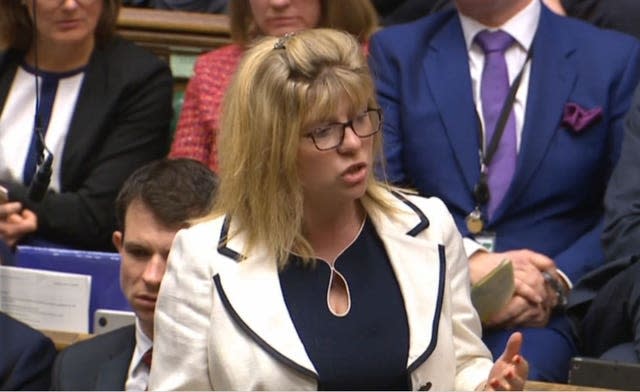Health minister to consider stronger warnings of cancer link to breast implants
Calls for stronger warnings about the cancer risk linked to breast implants will be considered by the Government.
Health minister Maria Caulfield pledged to examine suggestions for the UK to follow the United States in issuing a “black box” warning on breast implant packaging.
This includes reference to a possible link between implants and a rare type of cancer of the immune system known as breast implant-associated anaplastic large cell lymphoma (BIA-ALCL).
Labour MP Fleur Anderson (Putney) had asked the minister to review both the link with cancer and the NHS guidance, advising that clearly explaining it would avoid GPs and patients making a diagnosis too late.

The exchanges came during a Commons adjournment debate on support for women affected by the PIP (Poly Implant Prostheses) breast implant scandal.
PIP implants were withdrawn from the UK market in 2010 after it was found they had been filled with non-medical grade silicone intended for use in mattresses.
Estimates suggest as many as 47,000 women in the UK were fitted with the implants, and a UK government-ordered report in June 2012 found the implants were made from an unauthorised silicone filler and ruptured at twice the rate of other implants.
Ms Caulfield told the Commons: “I absolutely take (Ms Anderson’s) point about making that information more readily available and I will take away her point about the black box labels that the FDA (Food and Drug Administration) is using in the US to see if we do need to improve the information available for women.
“Because any breast implant has the potential to cause a very rare form of non-Hodgkin’s lymphoma called breast implant-associated anaplastic large cell lymphoma.
“It’s not a breast cancer but a very rare form of non-Hodgkin’s lymphoma that grows in response to the body’s reaction to a breast implant.
“So it’s not specifically related to PIP, it can actually be a small risk for any breast implant.
“The MHRA has issued guidance for people with breast implants but I take (Ms Anderson’s) point that women need to be informed of that small risk when deciding to go for a cosmetic procedure and that’s something that we’ll certainly follow up after this debate.”
Opening the debate, Ms Anderson said doctors estimate that “unless action is taken there will be a peak in implant-related cancer deaths in 2026”.
After she warned women have been “suffering and dying in silence”, Ms Anderson raised cases of BIA-ALCL.
She said: “Susan Grieve, a mother of two young children, was the first person in the UK to have been recorded as dying from BIA-ALCL in 2013.
“As of December 31 2021, the MHRA has received 81 reports of confirmed BIA-ALCL.”
Ms Anderson also noted: “There’s a long list of peer-reviewed papers … which evidences the link with cancer in the UK and also internationally.
“But the NHS website mentions six times that there’s no cause for concern for women with PIP implants.
“It does say there’s a high risk of rupturing, but it should very clearly explain the link with cancer to avoid GPs and PIP victims missing this important link and making a diagnosis too late.”
Ms Anderson said the MHRA issued several medical device alerts stating that patients undergoing breast implants should be warned about BIA-ALCL before the operation, adding: “But this just does not go far enough.
“By contrast, for example, in America in 2021 the Food and Drug Administration made the links very clear and have placed so-called black box labels on breast implants warning that they have been linked to a host of chronic medical conditions, including autoimmune disease, joint pain, mental confusion, muscle aches and chronic fatigue as well as to lymphoma.”
